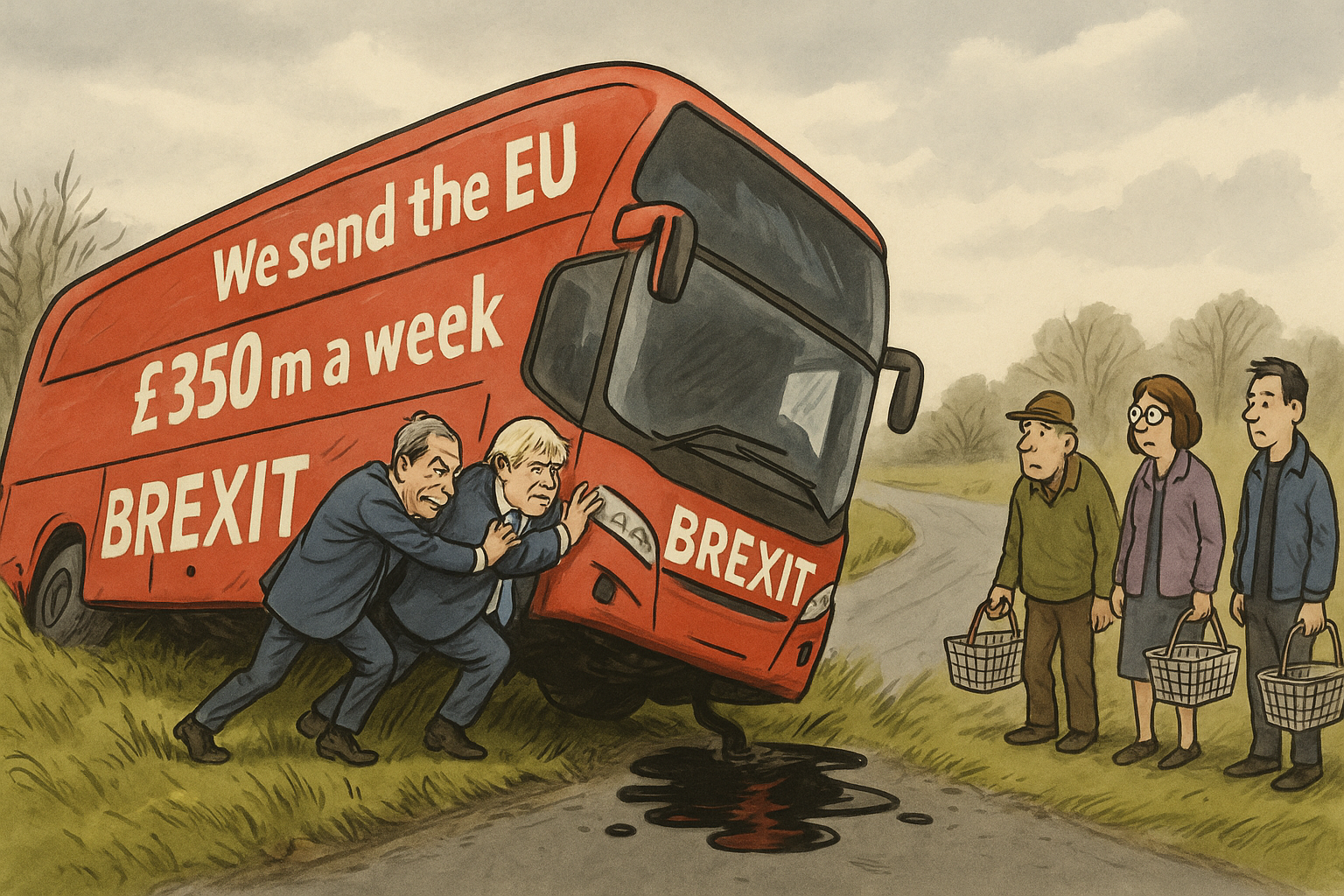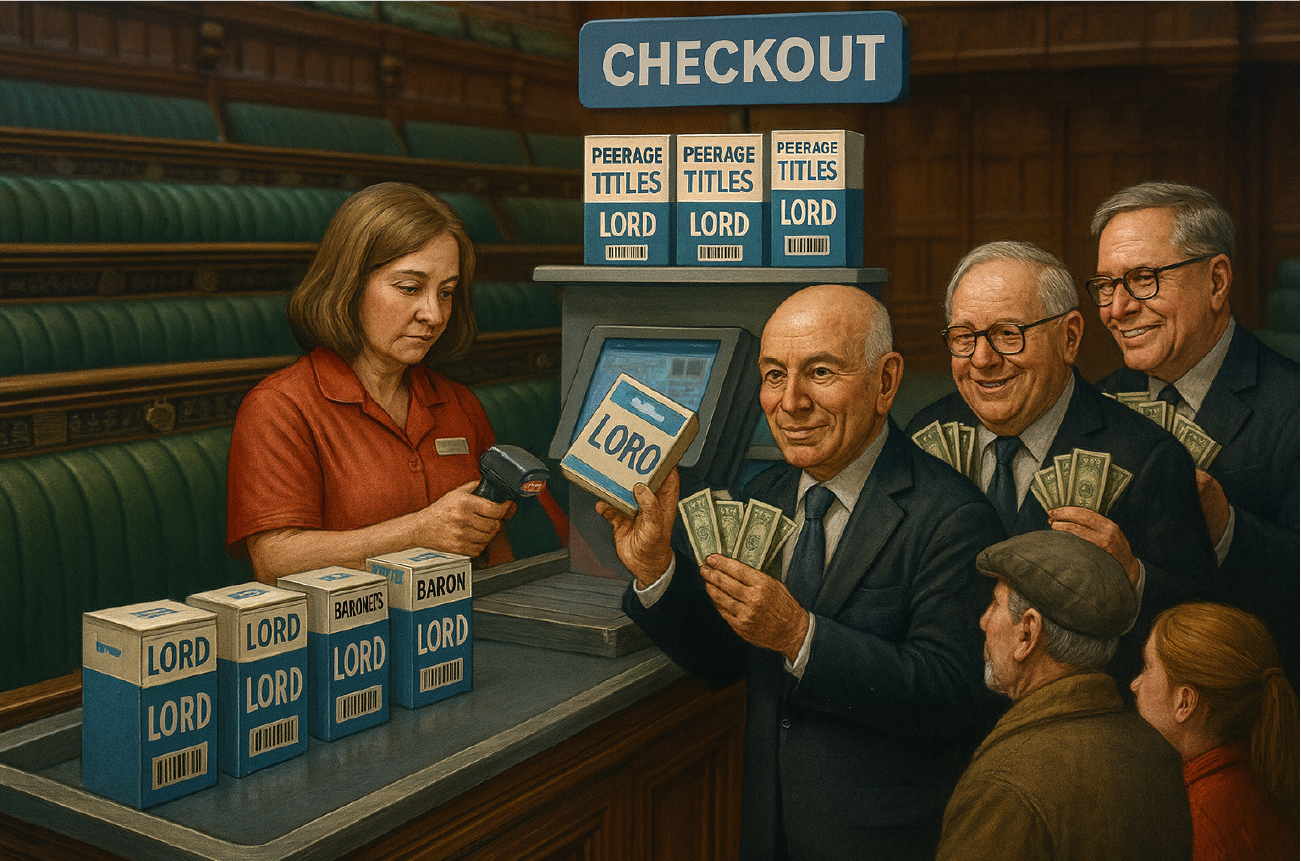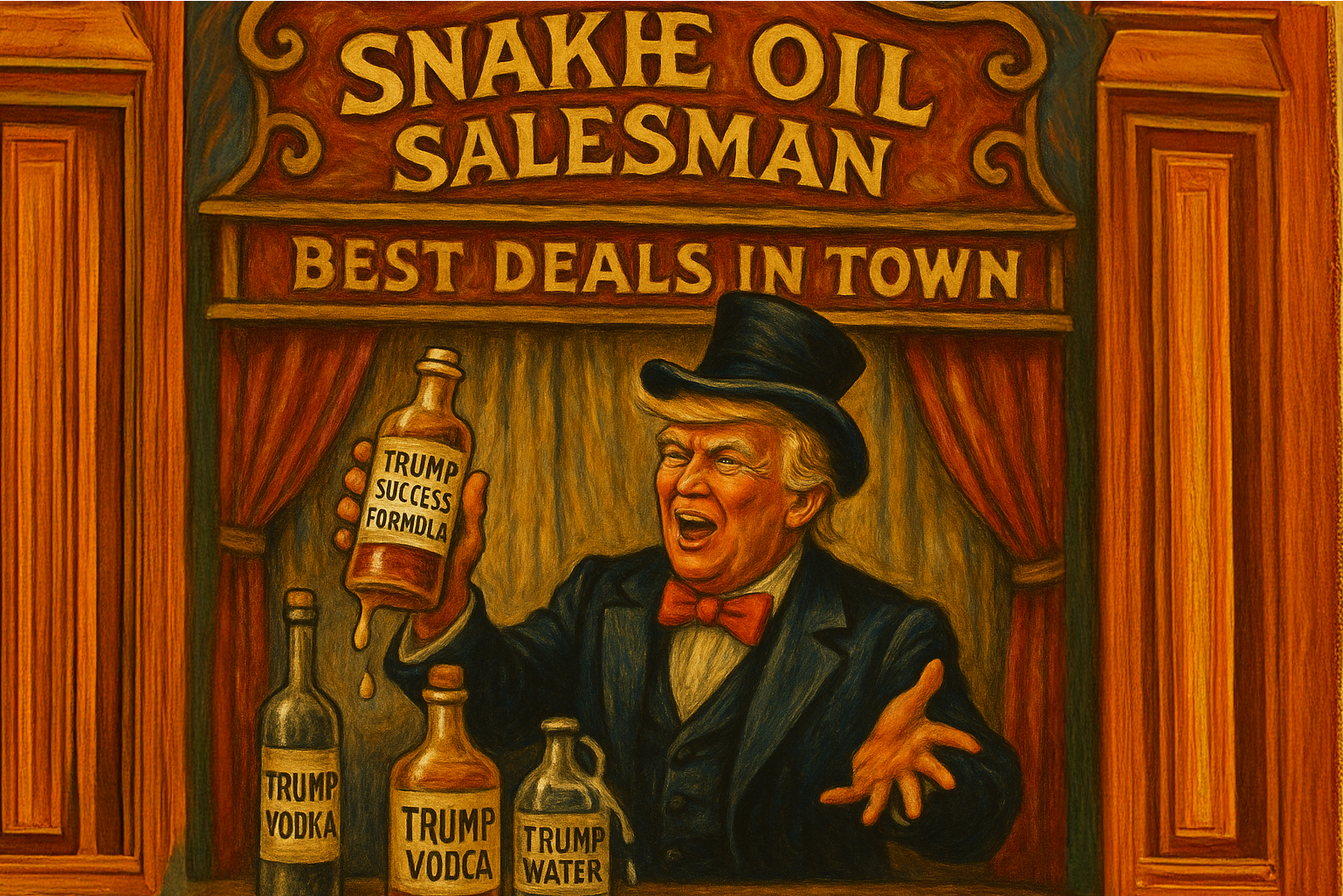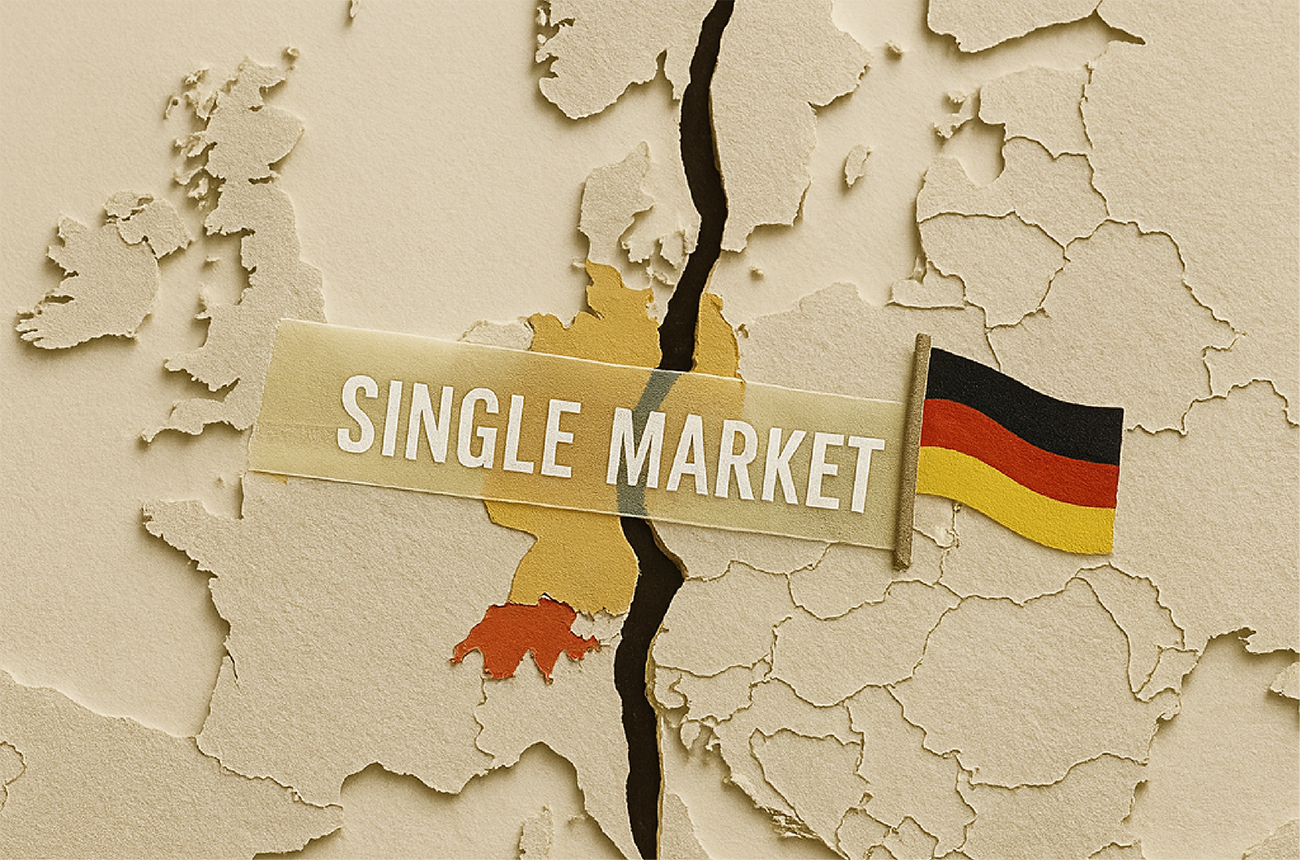Stay in the loop!
Summary
Nigel Farage has spent three decades perfecting a peculiar political art: turning half-truths, fearmongering and pub banter into national headlines. He styles himself as the pint-swilling defender of the “ordinary Brit,” yet his career is less about principle than performance. From the infamous Brexit bus promise of £350 million for the NHS to his poster depicting refugees as an invading horde, Farage has relied on spectacle over substance. When the promises unravel, he shrugs, blames “the elites,” and moves swiftly to the next stage.
This article tours the Museum of Brexit Malarkey, a satirical gallery of Farage’s greatest hits. The exhibits include his Brexit whoppers, migrant scare campaigns, a transatlantic bromance with Donald Trump, his Reform UK revival, a fresh crop of 2024–25 falsehoods, and the EU perks he pocketed while railing against Brussels. What emerges is a consistent pattern: exaggerate or fabricate, present it as common sense, and never admit fault. The outcome has not been national renewal but a politics where truth is optional, grievance is currency, and hypocrisy is standard issue.
Brexit Disinformation: Tall Tales of “Independence”
The centrepiece of Farage’s museum is the bright red bus emblazoned with the claim that leaving the EU would give Britain “£350 million a week for the NHS.” The figure was misleading: it ignored the UK’s rebate and EU funds flowing back into Britain. The UK Statistics Authority rebuked the claim as false, but it did its job during the campaign (UK Statistics Authority). The morning after the referendum, Farage denied responsibility, telling ITV he “would never have made that claim” and calling it a mistake by others on the Leave side (The Independent).
The pattern extended beyond money. Farage repeatedly warned that Turkey and several Balkan states were on the brink of EU membership, implying millions more migrants would flood Britain. David Cameron, then Prime Minister, countered that at its current pace Turkey would not qualify for entry until “the year 3000” (The Guardian). Farage also insisted that “75% of UK laws are made in Brussels,” a claim debunked by the House of Commons Library, which estimated EU influence at between 15% and 50% depending on definition (Full Fact).
The rhetoric was effective because it turned complex realities into simple grievances: Britain as a captive, Brussels as jailer. When post-Brexit Britain delivered more red tape and slower growth, Farage pivoted. By 2023 he conceded that “Brexit has failed,” but blamed politicians for mismanagement rather than acknowledging that his promises were hollow (Sky News). Responsibility, like the bus slogan, was thrown under the wheels.

Migrant Scaremongering: “Breaking Point” and Beyond
If the Brexit bus is Exhibit A, the “Breaking Point” poster is Exhibit B. Unveiled by Farage in June 2016, it showed a queue of mainly non-white refugees under the headline “Breaking Point: the EU has failed us all.” The backlash was immediate: it was reported to police for allegedly inciting racial hatred (The Independent), condemned by politicians across the spectrum, and compared to Nazi propaganda (Irish Times). Boris Johnson distanced himself, saying “that’s not my politics” (ITV News). Farage defended it as an “accurate, undoctored photo,” ignoring that the refugees pictured were fleeing Syria, not EU free movement.
This was not his first foray into migrant panic. In a 2015 televised debate, Farage claimed that “60% of people diagnosed with HIV in the UK were foreign-born” and that treating them cost the NHS too much. Rivals accused him of scaremongering, with Nicola Sturgeon saying “there’s nothing Nigel Farage wouldn’t blame on foreigners” (BBC). The statistic was misleading and stigmatising, but Farage doubled down, insisting it was about fairness.
He also smeared Romanians, once musing that people would be right to worry if “a group of Romanian men” moved in next door. Pressed on it, he suggested there was “a high level of criminality” from that community (The Guardian). Critics, including senior Conservatives, condemned it as xenophobia. Farage’s defence was the same as ever: he was merely “telling it like it is.”
The formula was simple: select a scary image or statistic, strip it of context, and present it as common sense. The damage was cumulative. By referendum day, immigration fears were the single strongest predictor of Leave voting, a legacy of Farage’s relentless framing (Byline Times).
Trump/MAGA Bromance: Across the Pond with Post-Truth Pals
Farage did not stop at Brexit. In August 2016 he appeared at a Trump rally in Mississippi, where Trump introduced him as “Mr. Brexit.” Farage told the crowd that Trump’s victory could be America’s Brexit moment. He later claimed Trump was “the bravest man I’ve ever met” (Reuters).
After Trump’s win, the relationship deepened. Trump tweeted that Farage would make a great UK ambassador to Washington, a breach of diplomatic protocol that Downing Street briskly rejected (BBC). The symbolism was clear: two populists validating each other across the Atlantic.
Farage also imported Trump’s tactics. After Trump lost the 2020 election, Farage echoed claims of “ballot harvesting” and suggested postal voting in the UK was corrupt. There is no evidence for either. Britain’s Electoral Commission confirms that proven voter fraud is vanishingly rare, with only a handful of cases each year (Reuters).
In 2025, Farage even found himself testifying in Washington at a Republican-led hearing on “censorship.” Democrats used the opportunity to label him a “Putin-loving free speech impostor” and “Trump sycophant,” pointing out that Reform UK itself had barred critical journalists from events (The Guardian). Farage, visibly rattled, protested, but the point landed: he had become the British satellite of Trumpism, complete with conspiracies, media bashing and hero worship.
Reform UK Revival: The Re-Brexit of Nigel Farage
With Brexit technically complete, Farage seemed destined for the after-dinner circuit. But by 2023 he was plotting a comeback through Reform UK, the successor to the Brexit Party. By mid-2024 he was back as leader, promising to “shape the next election” into a referendum on immigration (Financial Times).
At rallies he pledged to stop Channel crossings “within two weeks” of taking power, scrap net-zero policies, and bring back aggressive policing. The slogans were deliberately Trumpian: “Make Britain Great Again” featured heavily in speeches (Financial Times). Reform positioned itself as the authentic opposition to a Conservative Party seen as weak and a Labour Party cast as elitist.
The strategy was less about winning power in a first-past-the-post system and more about shifting the agenda. Polls showed Farage’s return lifted Reform support into the high single digits, enough to spook Tory MPs worried about vote-splitting (Politico Europe). The content was culture-war boilerplate — free speech under threat, Britain “betrayed,” migrants as invaders — but the effect was to keep Farage central to the conversation.
It worked. GB News gave him a nightly platform, his rallies attracted wall-to-wall coverage, and his persona as Britain’s political showman was refreshed. Reform UK became, in practice, Farage Ltd: grievance rebranded, Brexit nostalgia repackaged, and the man himself once again centre stage.
Farage’s 2024–25 Falsehoods: A New Blizzard
Farage’s comeback coincided with a fresh wave of dubious claims, promptly debunked by fact-checkers but amplified in sympathetic media. Among them:
- Immigration numbers. Farage claimed 2.4 million people had “settled” in the UK in two years. In reality, many arrivals were students or temporary workers. Net migration was 685,000 in 2023, not 2.4 million permanent settlers (The Guardian).
- Election fear-mongering. He alleged that winning candidates in multiple towns shouted “Allahu Akbar” and “we are coming to get you.” In fact, only one councillor in Leeds said “Allahu Akbar” in celebration, and he apologised. No evidence supports the rest (The Guardian).
- Economic cherry-picking. Farage boasted Britain was outperforming the EU. In reality, quarterly growth briefly exceeded the eurozone, but over the longer term the eurozone’s economy has grown more since 2019 (The Guardian).
- Shoplifting myth. He claimed Britons can shoplift up to £200 without prosecution. Police and courts routinely prosecute thefts far below that threshold (The Guardian).
- Labour smear. He said Keir Starmer had “fought hard” for lorry migrants to get benefits. In reality, as a lawyer Starmer argued a narrow case to prevent asylum seekers being left destitute while claims were processed (OpenDemocracy).
The rhythm is the point: exaggerate, provoke outrage, move on before the correction lands. As Byline Times observed, Britain is facing a “blizzard of lies” in campaigns where misinformation is not an accident but a strategy (Byline Times).
EU Hypocrisy: Pensions, Perks and the Gravy Train
The finale of the museum is the most on-the-nose exhibit: Nigel Farage, scourge of Brussels, cashing the Brussels cheque. Two decades as an MEP secured him a pension of about £73,000 a year, starting at 63. When asked if he would take it, he said “of course,” adding that he was the “turkey voting for Christmas” (The Ferret). Critics called it shameless hypocrisy, railing against the EU gravy train while pocketing its spoils.
EU auditors also found that Farage had misused about €40,000 of staff allowances, paying for party work rather than EU duties. The European Parliament docked half his salary for a year to recover it (The Guardian). His attendance record was among the worst of any British MEP, with barely half of votes attended, yet he drew full pay and expenses.
Meanwhile, Farage ensured his own family retained EU benefits. Two of his children hold German passports via their mother, giving them freedom of movement denied to millions of young Britons after Brexit (The Guardian). He once denied rumours that he had applied for German citizenship himself, but the symbolism remains: the man who told others to sacrifice EU rights quietly preserved them for his own family.
The hypocrisy is complete. Farage built his career denouncing Brussels as wasteful and parasitic, while profiting from its salaries, allowances and pension. He urged others to give up EU freedoms, while protecting them for his children. The gravy train, it turns out, was not something to be derailed but a carriage to ride until the very last stop.
Conclusion
Touring Farage’s Museum of Brexit Malarkey reveals a career built on spectacle, grievance and contradiction. The exhibits differ in subject — NHS billions, migrants, Trump rallies, Reform UK slogans, pensions — but the method is constant. Take a grievance, inflate it with falsehoods, strip nuance, and sell it as common sense. When reality intrudes, blame elites and move on.
Farage’s defenders argue he “told truths others wouldn’t.” The record shows otherwise: he bent statistics, misled voters, and stoked cultural division. Fact-checkers from BBC Reality Check, Full Fact, Reuters Fact Check and others have dismantled claim after claim. Independent investigations by Byline Times and OpenDemocracy have exposed the hypocrisy. Farage’s response has been to sneer at “mainstream media” and double down.
The deeper legacy is cultural. British politics is now more conspiratorial, more hostile to expertise, and more tolerant of outright falsehoods than before. Farage did not cause this alone, but he embodied it. Without his relentless campaigning, Brexit likely would not have happened. Without his framing, immigration might not dominate discourse to the same extent. And without his example, other populists might not feel so free to make politics a post-truth carnival.
The question is not just what Farage has done, but what we have allowed. His malarkey succeeded because it was entertaining, emotive, and repeated until believed. If Britain learns from this, Farage will be remembered as a cautionary tale. If not, his museum is less a relic than a manual for the next showman waiting in the wings.








-01.png)

